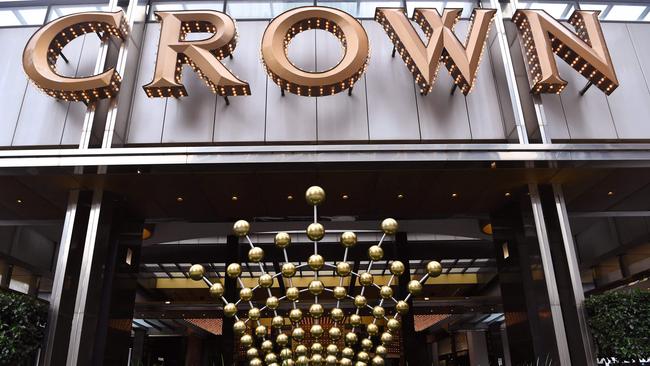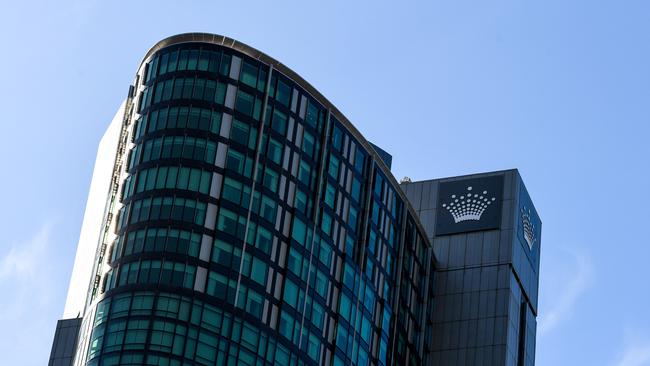
The good news in the wake of the $8bn Blackstone bid is he has plenty of time on his side and now one hat is in the ring there is also the chance of a higher bid.
The logical end game is that Packer’s influence over the casino empire has peaked and it’s a question of how and at what price he steps back.
The question, then, would be raised — what chance of combining regional monopolies in The Star and Crown under the one house?
The ACCC would have a say in the issue, but there may be a case in there being many ways to have a punt.
Blackstone’s $11.85-a-share bid is the opening gambit aimed at getting its team, led by Singapore-based Alan Miyasaki and Sydney-based Chris Tynan, in the door to do due diligence.
Crown shares closed at $11.97, above the $11.85 offer price, which tells you the market — like Oliver Twist — wants more.
The bid is obviously subject to regulatory clearance and by definition is opportunistic, as Crown’s 37 per cent owner Packer faces two royal commissions and an Austrac investigation while waiting for the expected NSW clearance to open his Sydney Barangaroo casino.
Just as the Pope is a Catholic, shareholders from Packer down will be looking for a higher bid.

The obvious word from the Packer camp is this bid, which really just takes Crown back to pre-COVID days, is not in the ballpark and it is running the line that by the time Blackstone gets clearance, all the Crown issues will be fixed.
One of these is the company has been a private fiefdom for its 14-year existence masquerading as a publicly listed company. Its board was selected by the major shareholder largely for favours and its regulatory snafus from Austrac to China are clear evidence.
Blackstone has extensive gaming and casino interests in the US and Europe, has a 10 per cent stake in Crown and, with Chris Tynan its local property guru handling the deal locally, this tells you where its interests lie. The private equity powerhouse has long coveted Crown’s property assets.
But it insists this is a full bid for the company that offers shareholders a potential clean run amid the regulatory mess that Packer is in right now.
That’s the question Packer must consider, given there is every chance he will be forced to limit his voting stake in the company to gain regulator clearance.
Austrac investigations can run for months into years and royal commissions are rarely foregone conclusions.
All of which adds some uncertainty against the chance to take Blackstone’s cash and move on.
Blackstone’s bid, as flagged by The Australian on Sunday night, was handed to Crown chair Helen Coonan on Sunday. She is attempting to build a new board and a hostile takeover bid is the last thing she wanted. But it also was not entirely unexpected.
Crown is paying the price for its long-running governance vacuum and the battle is now on.
Best-laid carbon plans
Australian companies scored full marks for commitments to declarations of carbon neutrality by 2050 but less so on laying down firm plans on how to get there, or capital commitments.
These are among the first results from the Climate 100 group, which now includes 575 global investors with a combined $5.5 trillion under management who have now set firm benchmarks to measure progress to achieving the aims.
The global group, which includes founding members Australian Super, HSBC and Calpers, have set the benchmarks to measure progress so investors and the companies know exactly where they stand.
Wesfarmers last month detailed divisional progress on carbon reduction in its investor presentation, which was a first for an Australian company, prompted by increasing investor demand for concrete results on carbon reduction.
Climate 100 selected a group of 167 companies around the world for its benchmarking, which included the major emitters, which in Australia meant AGL, BHP, BlueScope, Rio Tinto, Santos, Origin, Woolworths, Adelaide Brighton, South32, Qantas, Woodside and Boral.
Australian companies scored highly in terms of overall commitments, but BHP, Santos and Rio were among the only ones to detail actual plans to get to the targets.
Climate 100 said more than half of the companies in the initiative globally had set a net-zero by 2050 goal (52.5 per cent of total) for their operational emissions, but only 9 per cent had a net zero target that covered the firms’ most material scope 3 emissions.
These are emissions by customers, and Australian companies scored well on this metric with BHP, Rio, Origin, AGL, Woodside and Woolworths the better ones.
Climate 100 noted: “While many companies have set targets, few of these are aligned with a credible 1.5C/well below 2C scenario, and few cover the most material emissions sources for the company.”
It said: “Less than one in five companies have set out a clear strategy for decarbonisation that quantifies the key elements of this strategy.
“Less than 5 per cent of companies (or one in 20) have committed to align its capital allocation decisions to its targets.”
The message for corporate Australia is that investors are increasingly taking climate initiatives seriously and the time for well-meaning talk is over. They actually want to see results.
The Climate 100 benchmarking was released globally on Tuesday.
Penn does Telstra sums
Telstra’s Andy Penn clearly thinks the market doesn’t understand just how much his empire is worth, which explains the constant tinkering with his corporate structure.
The latest version has the fixed infrastructure assets worth about $11.4bn, towers at $4.7bn, Servco (customers) at $36bn and international at $2bn, which adds up to $53.7bn — well ahead of the market value at $38.2bn.
The fixed infrastructure is sitting on the gold mine of $1bn in taxpayer handouts for the next 35 years to pay for NBN’s ducts and other borrowed assets. When and if NBN is sold, this division is a prime candidate to be sold to the new NBN owner, minus of course any Telstra influence.
The divisions will be placed under a holding company to increase the transparency of the underlying valuations. Now all Penn needs to do is actually increase earnings and he is sitting on a valuable entity.






James Packer has a choice of $3bn in Blackstone cash in his pocket or running the risk of tougher-than-expected action from the regulators.